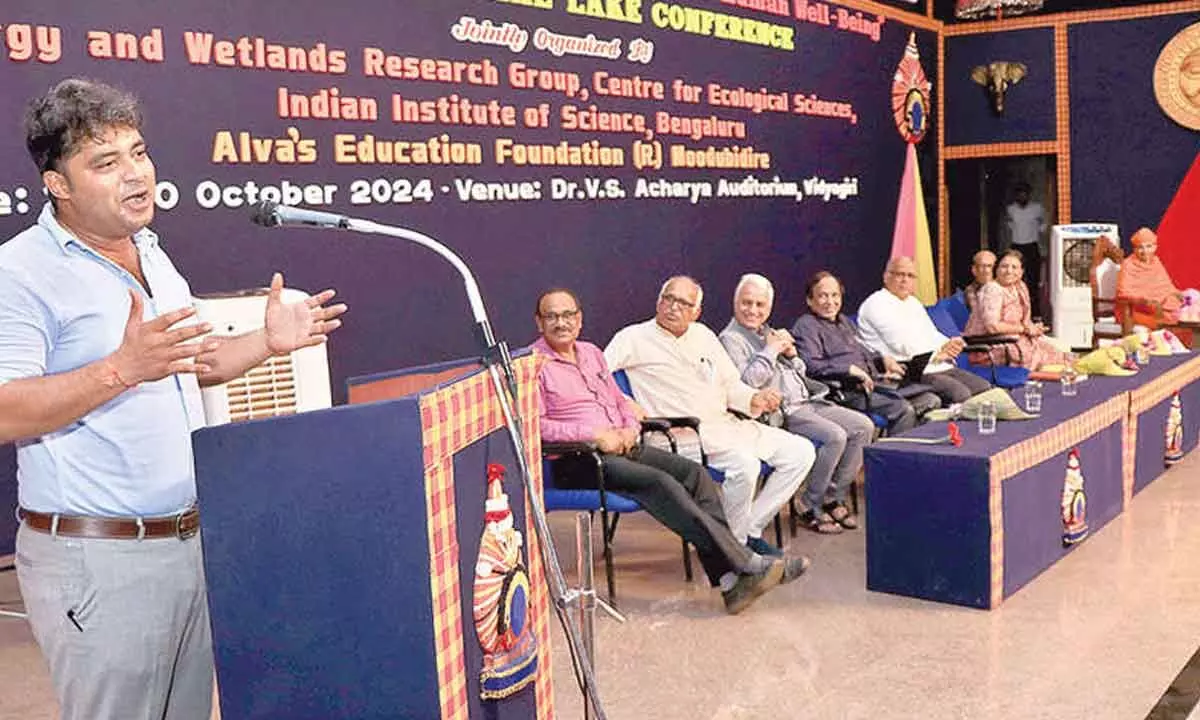Live
- Depression: Is It a Choice? Strategies to Overcome Mental Hurdles
- Artificial Sweeteners and Cravings: The Harmful Combination?
- Drugs worth Rs 250 crore seized in Gujarat, three held
- They exemplify courage and determination: PM Modi pays tribute on Police Commemoration Day
- With eye on China, PM Modi says India does not build relations on ‘taken-for-granted’ basis
- How Is AI Revolutionising Algo Trading for Everyday Investors
- Northern Arizona University Partners with Risaya Academy to Launch Summer School for Indian Students in the USA
- US Defence Secretary arrives in Kyiv on fourth Ukraine visit
- India's progress brings joy to world, not envy: Prasoon Joshi
- Tata Motors to supply 1,000 diesel bus chassis to UPSRTC
Just In
Conservation and rejuvenation are the key: Experts


The14th Binniel Lake Conference held here in the campus town of Moodabidire ended on Sunday with a call to sensitise GenX about the importance of conservation of the water bodies.
Moodubidire : The14th Binniel Lake Conference held here in the campus town of Moodabidire ended on Sunday with a call to sensitise GenX about the importance of conservation of the water bodies.
In 1998, the Energy and Wetlands Research Group at the Indian Institute of Science, Bangalore’s Centre for Ecological Sciences, organised the symposium for the first time. The theme was broadened in 2000 (Lake 2000) with a wider participation of education institutions, government and non-governmental organisations, etc. The basic idea of the symposium was to bring out the trends in ecosystem conservation, restoration, and management, including the hydrological, biophysical, people’s participation, the role of non-governmental, educational, and governmental organisations, and future research needs.
Lake 2024, the 14th Biennial Lake Conference focused on “Wetlands for Human Well-Being, ” held in hybrid mode from 17-20 October 2024 at, Alva’s College, Vidyagiri campus, Moodubidire, and online (through Zoom). Lake 2024 conference provided a unique opportunity for a wide range of stakeholders, from researchers, academicians, policymakers, practising proposals, young researchers (schools and colleges), and NGOs, to meet and deliberate on vital ecological and environmental issues focusing on the wetlands ecosystems. Deliberations at Lake 2024 were streamed live on YouTube.
The conference witnessed altogether 52 presentations from invited delegates during the three days of deliberations: 8 invited talks (young researchers), 20 (12 keynote addresses and 8 plenary lectures by the national and international senior researchers), and 24 technical talks. The uniqueness of Lake 2024 is the participation of school and college students. There were 174 paper presentations from school, college and research scholars: 38 presentations from 8th standard, 45 presentations of 9th standard students, 16 presentations from 6-8th standard rural schools, 19 presentations from 9th standard rural and 10 presentations from tenth rural students, 32 presentations from X to XIIth standard students, 13 presentations from UG students, 3 presentations from PG students, 10 presentations from research scholars, 11 presentations from young faculty (from universities) and teachers (schools and colleges), and one presentation from an NGO representative.
Apart from these, there were 75 poster presentations: 12 posters from researchers of IISc IISc-EIACP, 13 posters from 6-8th standard students (urban), 9 posters from 9th standard, 17 posters from 10th to 12th standard students (urban), 2 posters from 6th to 8th standard students (rural), 12 posters from UG category, 2 posters from PG category, 4 posters from research scholars, and 4 posters from NGO and government officials. Students implemented their projects under the guidance of their teachers, who are equally concerned about crumbling environments and fragile ecosystems.
The Lake 2024 team conducted an orientation program popularly known as ‘Know your ecosystem’ from January to May 2024 in various schools and colleges to train young students to carry out experiments related to the theme of the conference. Also conducted workshops to evaluate students and select students for the Lake 2024 conference.
There were about 524 school students, 82 college students, 25 researchers, and 6 teaching faculty who took part in these competitions. Students who excelled in their research with field data collection, interpretation, and synthesis of data and presentation were chosen and awarded Sahyadri Young Ecologists (school and college category); similarly, researchers were awarded Sahyadri ecologists and mentors as Sahyadri Shikshaka (faculty from universities and research organisations).
The participation included researchers from 8 States (Uttarakhand, Jammu and Kashmir, Goa, Manipur, Kerala, Tamilnadu, West Bengal, Uttar Pradesh, Delhi, etc.) of India, many districts (Uttara Kannada, Bangalore city, Bangalore rural, Mysore, Mangalore) from Karnataka, and senior scientists and practitioners from several countries (Nepal, Canada, Russia and Africa). Significantly, 18 are from rural Karnataka, and all these researchers (urban, rural, and international) bonded together by their common concern for saving the planet and their future. The beginning of the symposium was marked by keynote lectures from experts highlighting the issues of wetlands, livelihood aspects, biodiversity, ecology, hydrology, ecosystem structure, functions of ecosystems, goods and services, livelihood aspects, biodiversity documentation, and flora of India.
A range of issues of common concern related to wetlands ecosystems, the environment, and the livelihood of people were deliberated in the forum, particularly on the spatial extent and conditions of ecosystems and the valuation of ecosystem goods and services. The conference emphasised the need for participatory management of all ecosystems on scientifically tested foundations and principles. The forum of LAKE 2024 unanimously adopted a charter of recommendations for the government to implement with the time-bound action plans.

© 2024 Hyderabad Media House Limited/The Hans India. All rights reserved. Powered by hocalwire.com






